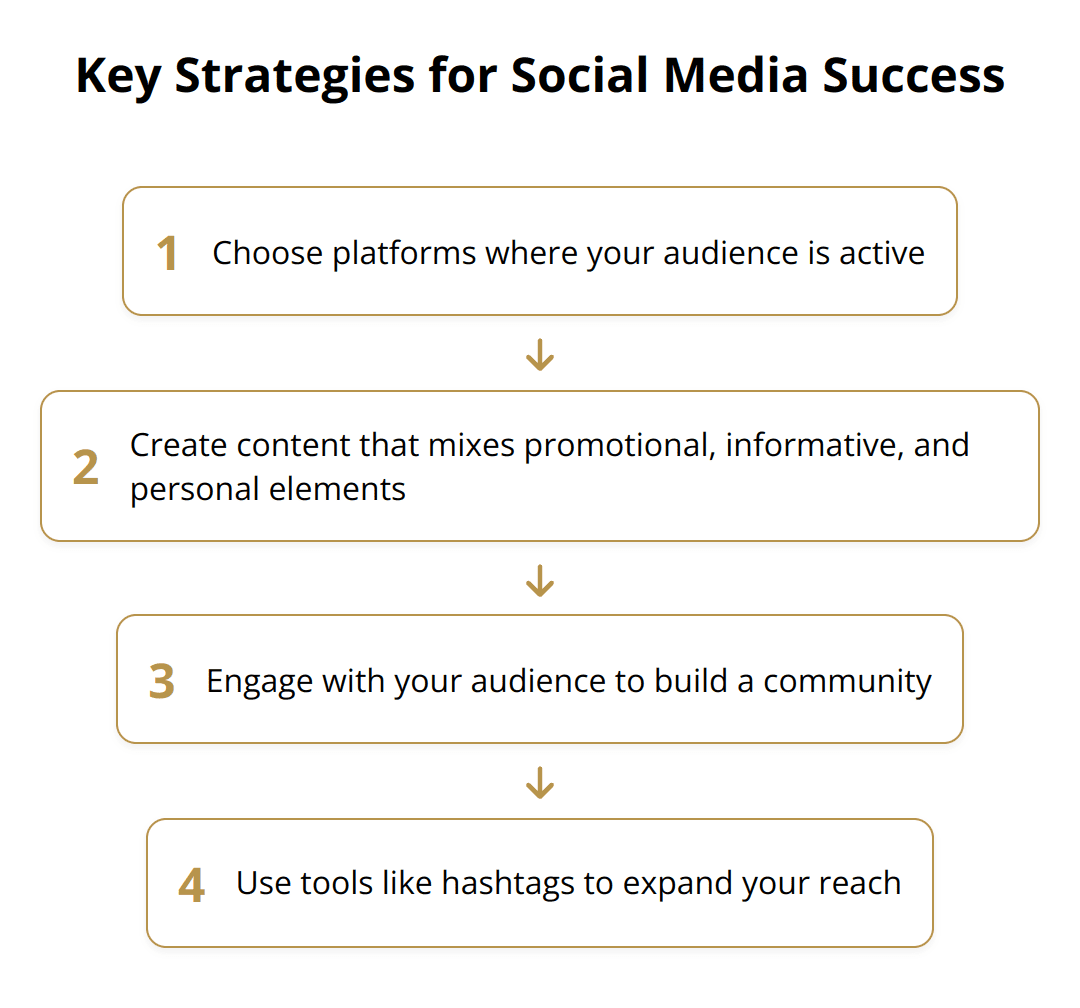In an ever-evolving literary landscape, personal branding has emerged as an essential strategy for writers looking to distinguish themselves. At Beverly Hills Publishing, we understand the power of a well-crafted personal brand in establishing a writer’s presence and connecting with their audience.
This guide is designed to navigate the intricacies of personal branding, offering practical advice and proven strategies for writers at any stage of their career. From identifying your unique value proposition to leveraging social media effectively, we’ll explore how to build and enhance your brand as a writer.
Crafting Your Writer’s Brand
Personal branding is the process of marketing yourself and your career as a brand. It’s about highlighting what makes you unique and valuable as a writer and using that to stand out in a crowded market. For writers, establishing a personal brand is not a luxury—it’s a necessity. In a digital age where content is king, your personal brand can be the deciding factor in your career’s success or stagnation.
A strong personal brand opens doors. It can lead to better publishing opportunities, increase your visibility, and attract a loyal readership. More importantly, it allows you to control the narrative of who you are as a writer. Think of J.K. Rowling or Stephen King. Their names alone evoke a specific genre, writing style, and reader expectation. That’s the power of a personal brand at work.
For actionable insights:
- Identify Your Unique Value: What do you bring to the table that others don’t? Is it your unique writing style, your ability to weave intricate plots, or your expertise in a niche subject? Recognizing and owning your unique value proposition is the first step.
- Establish a Consistent Online Presence: Whether it’s through a personal website, social media platforms, or both, showcasing your work and connecting with your audience online is key. Regular, authentic engagement builds trust with your audience. Tools like WordPress for website creation and Hootsuite for social media management can simplify this process.
- Share Your Journey: Readers and potential collaborators are not just interested in the end product. They are drawn to your process, struggles, and successes. Sharing behind-the-scenes glimpses into your writing life can make your brand more relatable and engaging.
- Network and Collaborate: Building relationships with other writers, publishers, and influencers in your genre can expand your reach. Guest posts, podcast interviews, and collaborative projects are great ways to introduce your brand to new audiences.

- Keep Evolving: The literary landscape constantly changes, and so should your brand. Stay informed about publishing trends, experiment with new content formats, and adjust your strategies as you grow.
In conclusion, personal branding for writers is not about crafting a superficial image. It’s about strategically presenting your authentic self to the world and making genuine connections with your audience. It’s a long-term investment in your career that, when done correctly, pays off in increased recognition, opportunities, and success.
Elevating Your Writer Brand
Building a strong personal brand as a writer is essential in today’s competitive landscape. Your brand not only encompasses your work but also represents your identity in the marketplace. Here are practical steps to enhance your brand, attract a larger audience, and secure more opportunities.
Identifying Your Unique Value Proposition
Your unique value proposition (UVP) is what sets you apart from others. It could be your distinct voice, your unparalleled insights into specific themes, or your ability to tell stories in ways no one else can. Pinpointing your UVP requires self-reflection and, possibly, feedback from readers or peers. Once identified, your UVP should be the cornerstone of all your branding efforts. It’s what you’ll communicate in your website’s “about” page, the bio on your social profiles, and the pitches for your books.
Creating a Consistent Online Presence
Having a consistent online presence is vital. Your website and social media profiles should reflect your brand’s look and feel. Consistency in your visual identity (colors, logo, typography) and in your tone of voice across different platforms helps in building brand recognition.
Regularly update your website with blog posts, events, and book releases to keep your audience engaged. On social media, engage with your followers, share insights into your writing process, and repost relevant content from others in your niche. Mastering these platforms can be complex, but tools like WordPress for website design and Hootsuite for managing social media can simplify it. Ensure your content strategy is aligned with your overall brand message.
Networking and Community Engagement
Your brand grows with your network. Engaging within writing communities and participating in literary events can introduce you to potential collaborators and audiences. Online forums, writing groups, and social media platforms are ripe for connection.
Offer to guest blog on websites relevant to your niche or solicit collaborations that can expose your brand to broader audiences. Remember, effective networking is reciprocal; always look for ways to offer value in return.
By implementing these strategies thoughtfully, you can elevate your brand as a writer. Your unique value proposition will become clearer to your audience, your online presence will attract more followers, and your network will open new doors for your career.

Here are a few key reminders:
- Consistency is key in branding. Ensure your brand visuals and messages are consistent across all platforms.
- Engage regularly with your audience and network. Authentic engagement helps build lasting relationships.
- Stay adaptable; the literary market evolves, and so should your brand. Keep abreast of trends and adjust your strategy as needed.
- Use tools like WordPress and Hootsuite to efficiently manage your online presence.
Enhancing Brand Through Social Media
Leveraging social media to enhance your personal brand requires a strategic approach, focused on selecting the right platforms, creating engaging content, and building meaningful relationships. Social media is not just a tool for promotion but a dynamic space for establishing your presence and connecting directly with your audience.
Selecting the Right Platforms
The first step is choosing platforms where your potential readers are most active. Not all social media platforms are created equal; each has its own nuances and audience preferences. For writers, platforms like Twitter and Instagram can be especially beneficial. Twitter is excellent for networking with other writers and industry professionals, while Instagram allows for a more visual storytelling approach, showcasing your writing process, book covers, or event photos. However, don’t spread yourself too thin. Focusing on one or two platforms where you can consistently post quality content is more effective than having a marginal presence across many platforms.
Creating Engaging Content
Your content on these platforms should be a mix of promotional, informative, and personal posts. Sharing updates about your writing projects is a given, but also share insights about your writing process, books or articles you find interesting, and occasional personal anecdotes. This mix keeps your content fresh and your audience engaged. Remember, authenticity attracts, so let your genuine interests and personality shine through. For insights into making content that resonates, exploring best practices for digital content can provide valuable guidance.

Building Relationships with Your Audience
Engagement is a two-way street. Responding to comments, participating in relevant conversations, and acknowledging followers’ milestones or works fosters a sense of community. Hosting live Q&A sessions, polls, or contests can also increase interaction rates. Moreover, using tools like hashtags can extend your reach beyond your current network, connecting you with readers and professionals interested in your niche.

To sum up:
- Choose platforms based on where your audience spends their time.
- Mix promotional, informative, and personal posts to keep content engaging.
- Engage actively with your audience to build a community.
By meticulously selecting the right platforms, crafting engaging content, and fostering genuine interactions, social media can significantly enhance your personal brand as a writer. Remember, social media is not just a megaphone for broadcasting your achievements but a channel for building lasting, meaningful connections with your audience.
Wrapping Up
Personal branding stands out as the beacon that guides writers in the digitally saturated market of today. The journey to crafting a unique and recognizable personal brand is both vital and ongoing. It begins with understanding and embracing your unique value proposition, which sets the stage for everything you do. Consistency in your online presence fortifies your brand, making you easily recognizable and dependable in the eyes of your audience. Engaging with your community, sharing your journey, and networking widely can expand your reach and deepen the impact of your work.
![Key Takeaways - Personal Branding for Writers [Guide]](https://b3004418.smushcdn.com/3004418/wp-content/uploads/2024/04/Personal_Branding_for_Writers__Guide__5_2024_04_25_07_12_58_020246_00_00.png?lossy=1&strip=1&webp=1)
The digital age demands that writers not only adapt but also continuously evolve their branding strategies to stay relevant. This means closely following publishing trends, experimenting with new content formats, and adjusting your approach based on what resonates with your audience. Personal branding is more than a strategy; it’s a commitment to presenting your authentic self and connecting genuinely with your readers.
At Beverly Hills Publishing, we champion the continuous journey of learning and adaptation in personal branding. Our unique approach intertwines strategic branding with groundbreaking publishing, propelling authors to the forefront of their industries. We believe that a strong personal brand is the foundation for establishing industry authority and enhancing both personal and professional brands.
Here are key actions to take away:
- Embrace your uniqueness to stand out.
- Be consistent and authentic online.
- Network and collaborate for greater reach.
- Stay adaptable and open to learning.
We encourage every writer to take proactive steps toward developing a strong personal brand. The effort and dedication you put into it today will pave the way for your success tomorrow. Let your personal brand be a true reflection of who you are and what you wish to achieve in the world of writing.















































































































































































































































